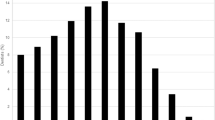Abstract
Aim To investigate the relationship between generic and condition-specific (CS) quality of life, general psychological wellbeing and personality in patients with tooth wear.
Materials and methods Ethical approval was granted (REC:10/H0709/21). Patients aged 18-70 years with tooth wear completed the Oral Impact on Daily Performance (OIDP) quality of life questionnaire, the NEO-FFI Personality questionnaire and the General Health Questionnaire-12 (GHQ). Tooth wear was measured with the Basic Erosive Wear Examination (BEWE).
Results In total, 102 subjects were recruited. Increased BEWE scores were correlated with older age and worse generic and CS-related quality of life. Increased neuroticism was correlated with increased: generic and CS OIDP scores; generic and CS eating scores; CS smiling scores; and CS carrying out major work scores. Increased GHQ scores were positively correlated with increased: generic and CS OIDP scores; generic and CS eating scores; CS speaking scores; generic and CS cleaning scores; generic relaxing scores; generic and CS smiling scores; and generic emotional state scores (p <0.05). Multivariable linear regression analyses showed that increased neuroticism and decreased GHQ both had an independent effect on generic and CS OIDP scores when adjusted for tooth wear severity (p <0.05).
Conclusion Quality of life perception is complex and was not only affected by worsening levels of tooth wear.
Key points
-
Quality of life in patients with tooth wear is affected by other psychosocial factors.
-
Subjects with higher levels of neuroticism showed decreased quality of life independent of tooth wear severity.
-
Subjects with lower levels of general psychological wellbeing showed decreased quality of life independent of tooth wear severity.
This is a preview of subscription content, access via your institution
Access options
Subscribe to this journal
Receive 24 print issues and online access
$259.00 per year
only $10.79 per issue
Buy this article
- Purchase on Springer Link
- Instant access to full article PDF
Prices may be subject to local taxes which are calculated during checkout
Similar content being viewed by others
References
Berry D C, Poole D F G. Masticatory function and oral rehabilitation. J Oral Rehabil 1974; 1: 191-205.
Smith B G N, Knight J K. An index for measuring the wear of teeth. Br Dent J 1984; 156: 435-438.
Van't Spijker A, Rodriguez J M, Kreulen C M, Bronkhorst E M, Bartlett D W, Creugers N H. Prevalence of tooth wear in adults. Int J Prosthodont 2009; 22: 35-42.
Haemmings K W, Howlett J A, Woodley N J, Griffiths B M. Partial dentures for patients with advanced tooth wear. Dent Update 1995; 22: 52-59.
Al-Omiri M K, Lamey P J, Clifford T. Impact of tooth wear on daily living. Int J Prosthodont 2006; 19: 601-605.
Rodriguez J M, Kalsi H J, Khan M A, Bomfim D I, Tsakos G, McDonald A. Personality, wellbeing, and quality of life in patients with tooth wear. Lancet 2013; 381: S94.
Bartlett D, Ganss C, Lussi A. Basic Erosive Wear Examination (BEWE): a new scoring system for scientific and clinical needs. Clin Oral Investig 2008; 12 Suppl 1: S65-S68.
Costa P T, McCrae R R. Personality Disorders and The Five-Factor Model of Personality. J Pers Disord 1990; 4: 362-371.
Goldberg D P. The detection of psychiatric illness by questionnaire. Oxford: Oxford University Press, 1972.
Adulyanon S, Vourapukjaru J, Sheiham A. Oral impacts affecting daily performance in a low dental disease Thai population. Community Dent Oral Epidemiol 1996; 24: 385-389.
Fenlon M R, Palmer R M, Palmer P, Newton J T, Sherriff M. A prospective study of single stage surgery for implant supported overdentures. Clin Oral Implants Res 2002; 13: 365-370.
Kent G, Johns R. Effects of osseointegrated implants on psychological and social well-being: a comparison with replacement removable prostheses. Int J Oral Maxillofac Implants 1994; 9: 103-106.
Ghodsi S Z, Chams-Davatchi C, Daneshpazhooh M, Valikhani M, Esmaili N. Quality of life and psychological status of patients with pemphigus vulgaris using Dermatology Life Quality Index and General Health Questionnaires. J Dermatol 2012; 39: 141-144.
Abu Hantash R O, Al-Omiri M K, Al-Wahadni A M. Psychological impact on implant patients' oral health-related quality of life. Clin Oral Implants Res 2006; 17: 116-123.
Costa Jr P T, McCrae R R. Neo personality inventory-revised (neo-pi-r) and neo five-factor inventory (neo-ffi) professional manual. Odessa, FL: Psychological Assessment Resources, 1992.
Krabbendam L, Janssen I, Bak M, Bijl R V, de Graaf R, van Os J. Neuroticism and low self-esteem as risk factors for psychosis. Soc Psychiatry Psychiatr Epidemiol 2002; 37: 1-6.
Acknowledgements
The authors would like to acknowledge Dr Aviva Petrie for her kind assistance with the statistical analyses.
Author information
Authors and Affiliations
Corresponding author
Ethics declarations
The authors declare no potential conflicts of interest with respect to the authorship and/or publication of this article.
Rights and permissions
About this article
Cite this article
Kalsi, H., Khan, A., Bomfim, D. et al. Quality of life and other psychological factors in patients with tooth wear. Br Dent J (2021). https://doi.org/10.1038/s41415-021-3168-8
Received:
Accepted:
Published:
DOI: https://doi.org/10.1038/s41415-021-3168-8
This article is cited by
-
Managing tooth wear with respect to quality of life: an evidence-based decision on when to intervene
British Dental Journal (2023)


